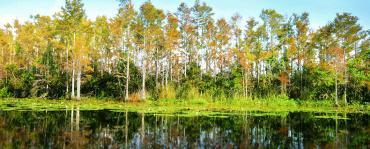
Most Florida environmental groups this special session made a lot of noise -- you heard them -- and spent a lot of money, but in the end, came away empty-handed and bitterly unhappy.
Not The Nature Conservancy.
The Conservancy (TNC), largest private conservation landowner in the world, including more than 60,000 acres in preserves from the Keys to the Florida Panhandle, walked its own path during both legislative sessions, never putting the U.S. Sugar Corp. option on its wish list.
What it did is quietly win record funding for its own top priority -- land management.
The Nature Conservancy, understand, is all about land management.
 "We applaud the Legislature," said Marianne Moran, TNC's director of government relations. "The budget going through right now includes $106 million in new management dollars. Adding that new money to an estimated base of $60 million means a record for Florida land management allocation. That's going to help address the significant backlog on our state lands."
"We applaud the Legislature," said Marianne Moran, TNC's director of government relations. "The budget going through right now includes $106 million in new management dollars. Adding that new money to an estimated base of $60 million means a record for Florida land management allocation. That's going to help address the significant backlog on our state lands."
Florida has a total of 9 million acres of conservation land, a colossal number -- more conservation land than the total land in four states. "We should be proud of that," TNC Associate Director of Conservation Kristina Serbesoff-King told me. "We are quite fortunate in this state. But it also means we have a heavy responsibility."
This is why I say The Nature Conservancy gets it.
"Buying new land is only part of the solution to protect Florida’s land, water, wildlife and recreation," Moran said. "Funding land management is critical because it helps the state realize the recreational and natural attributes provided by acquisition."
Unfortunately, she said, in recent years "there's been a political temptation to buy lands, cut the ribbon, then walk away without a plan to adequately fund management. This makes no sense and has had a detrimental effect on our resources. It’s something TNC recognized and wanted to lead on in 2015."
Moran hit the nail on the head. She struck a chord. It's always seemed to me land management is the cost of doing business. You can't buy land if you're not going to pay to take care of it. It's like buying a business, putting all your money into the big-ticket item without leaving room to pay for rent, utilities, advertising, insurance -- the recurring cost of doing business. If you don't take it all into account, the business fails.
Agriculture Commissioner Adam Putnam knew how far behind land maintenance is in Florida, and said as much in March to legislators looking to form a spending plan for Amendment 1 money.
The Nature Conservancy is wise to this because that's what they do. Conservation means what it says. Have a look at their website.
“If you don’t manage invasives, waterways clog," Moran explained. "If you don’t burn, scrub-jay habitat disappears and long-leaf forests aren’t replanted … and wetlands cannot be restored as intended.”
TNC had only two priorities for this year's budget: funding for land management that would eclipse the allocations of the past five years; and a significant increase in the Rural and Family Lands Program. Rural and Family Lands came out ahead, too, funded at $15 million. "We see this conservation easement program as the most targeted means of land protection, and it's the most cost-effective for the taxpayer," she said.
Asked why TNC didn't list U.S. Sugar's 46,800 acres among its priorities, Moran replied, "Florida has many conservation priorities. Considering the current backlog of billions of ongoing and planned Everglades restoration projects waiting to be implemented, we need to finish what we started." She said The Nature Conservancy nevertheless continues to support a dedicated funding source for Everglades restoration.
Many who deal with TNC on a regular basis credit Executive Director Temperince Morgan, on board for only about a year, with recent successes.
There's just so much to admire about the common-sense approach TNC brings to its conservation mission.
In the first place, unlike other environmental entitites, it has not historically been a litigious organization. Lawsuits are tactics for others when they can't get what they want; working with leadership to come up with a solution is the TNC way.
In the second place, they look at the Everglades and see and hear beyond the political noise, looking at problems few agencies are addressing.They see the Burmese pythons and other exotic animals. They see uplands so flooded in rainy spells that deer and other animals become trapped and starve there. They see a deadly exotic climbing fern, Lygodium microphyllum, overtaking islands, forcing out animals that grazed there. They see dying coral reefs in Florida Bay.
They are a lone voice sounding the alarm for many ills in a port-of-entry state, in a tropical climate where everything, good and bad, grows prolifically. And they are entirely refreshing.
Reach Nancy Smith at nsmith@sunshinestatenews.com or at 228-282-2423. Twitter: @NancyLBSmith.


